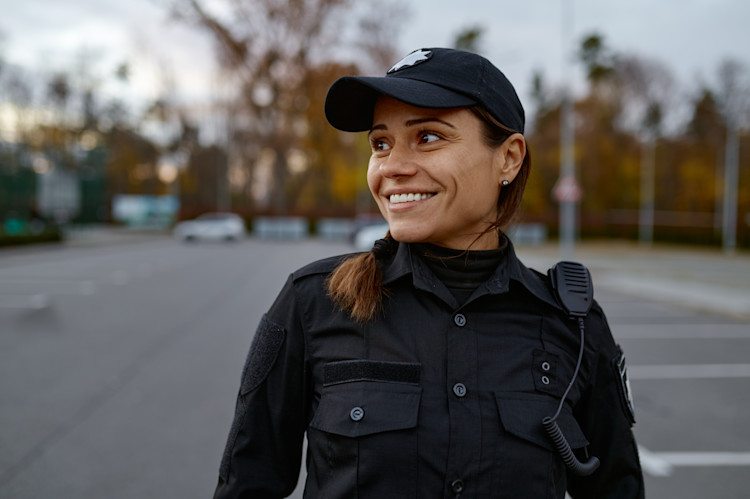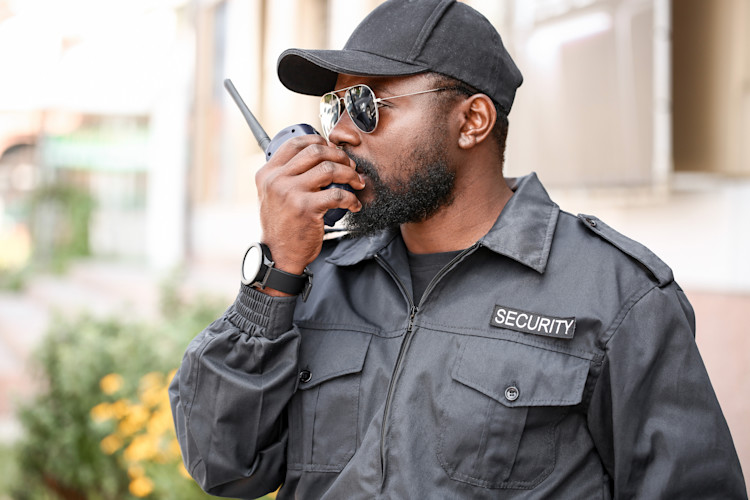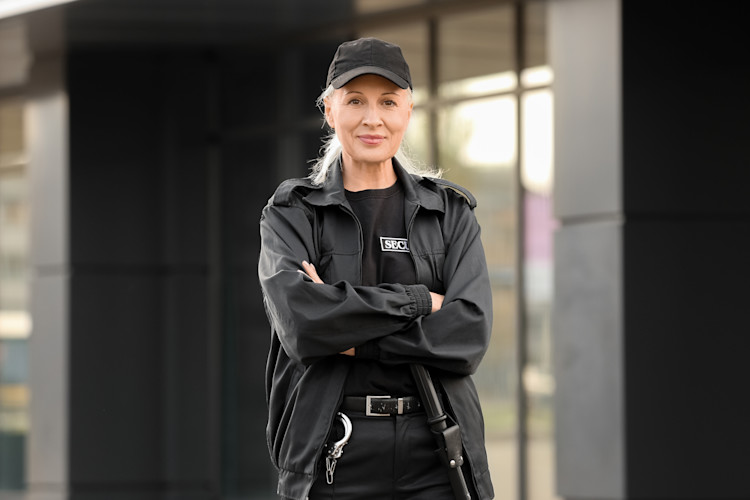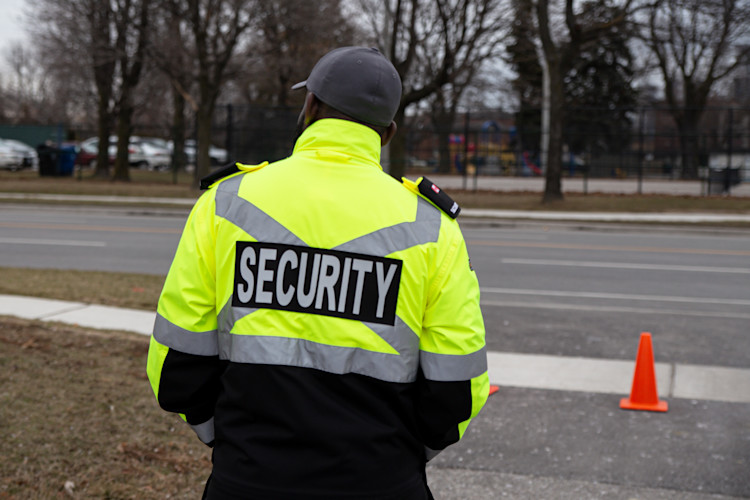Find a Security Guard Service near you
The average rating for Bark Security Guard Services is 4.76, based on 118,006 reviews
Need protection for your event or business, but not sure of the cost? Read our handy guide to find out how much your security guard will charge for their services.
When you pay for security, it instantly gives you peace of mind. It ensures that you’re protected and safe during difficult moments. Statistics show that there’re around 385,242 licensed private security officers in the United Kingdom. This demonstrates the ever-growing need for this service. You can hire a professional in this area to:
Keep you safe
Protect valuable assets
Respond to emergencies
Report suspicious activity
Communicate with the public
Provide some much-needed companionship
Investing in security is an investment in peace of mind and, often, the safeguarding of assets that are invaluable. By understanding how security services are priced and what factors come into play, you can make a well-informed decision that aligns with your needs and your budget.
Remember, cost should not be the only factor in your decision-making process—reputation, experience, and the ability to provide a tailored solution to your specific security requirements are equally as important.
You’re in the perfect place to find out how much a security guard costs in the UK. Remember that these numbers are based on our data and research. If you need a personalised quote, speak to a private security expert near you.

A typical private security price is £40 per hour. This is useful if you need a solo security guard, for just a short period.
Typically, for a standard security guard who does not have specialised training for high-risk environments, the hourly rate falls on the lower end of the spectrum – around £20 to £25. For more complex assignments such as surveillance, the presence of a bodyguard, or for services in high-risk regions or during high-risk periods, the hourly rates can be significantly higher, often breaching the £45 mark.
Sometimes, hiring a security guard for a single day is all you need. On average, for a standard non-armed security guard, you could expect to pay between £300 and £500 per day.
If you’re looking for 24/7 surveillance, the price per hour may drop slightly, but the total cost undoubtedly goes up. A rough estimate of the monthly cost for 24-hour security services can range from £5,500 to £8,500, including all associated overheads.
| Number of days | Average price of private security |
| 1 | £400 |
| 3 | £1,200 |
| 5 | £2,000 |
| 10 | £4,000 |
| 20 | £8,000 |
| 50 | £20,000 |
You can need security for dozens of different reasons. The more danger a security guard is in, and the more specialised the skills involved, the higher the price will go. Some of the main examples are listed below.
For events, the cost of security is heavily influenced by the size and nature of the event. Security firms may charge around £30 per hour for event security. Expect higher rates for larger events requiring more guards, and lower rates for smaller, less complex events.
Personal security or the use of bodyguards is one of the highest-priced services in the private security sector. Rates are roughly £50 per hour depending on the risk and the profile of the protected individual. Location also plays a part - you would be lucky to find a bodyguard in London for less than £50 an hour.
Protecting a commercial property involves several factors such as size, location, and the property’s specific vulnerabilities. For regular patrols and monitoring, expect to pay approximately £25 per hour. For more complex security systems including CCTV and response teams, the price can rise to £40 per hour or more.
Security spans a broad range of duties, from keeping a watchful eye over a retail store to protecting someone’s life. There are also security officers who transfer cash to the bank on behalf of businesses, known as CIT (cash-in-transit security). Though typically, CIT officers will operate as part of an ongoing contract, rather than be paid on an hourly rate. This may be £100 per hour.
A private investigator is a type of security guard – as they can give you details about a difficult situation. If this relates to your wellbeing, it may feel essential. They operate privately and thus work for you, and only you. The cost is roughly £60 per hour.
| Type of security | Average hourly rate |
| Event security | £30 |
| Bodyguards | £50 |
| Commercial property security | £25 |
| Cash-in-transit security | £100 |
| Private investigator | £60 |

You often have no choice but to hand over plenty of money to cover private security. It’s a high-stakes industry – and you can’t afford to cut corners. Especially if your safety and wellbeing are in question. Make sure you consider all the following details when setting your budget.
There’s a wide range of security services – from cash-in-transit to commercial property protection, or even personal bodyguards. Prices will correlate to the time and danger involved. Higher stakes protection will be more expensive.
There’s no question that you’ll feel safer when your security guard has lots of experience. They can anticipate the common ruses that people come up with to break through barriers. And they’ll also be more prepared to handle a difficult situation. You should clarify the experience of your security guard when you hire them. It may be worth paying more if it reduces your likelihood of being in danger.
When you’ve only got one security guard patrolling a property, or acting as your bodyguard, the price is unlikely to ever reach the thousands in a single day. But once there’s an entire team involved, this changes. Several vehicles may be needed, and a rotation of team members for when someone goes ‘off duty’. You need to cover the price of all the labour costs.
If you need security for a one-off event, it’ll hopefully stop your price from rising too high. But this is only doable when you know the precise window in which a threat will occur. Otherwise, if it’s an open window, you may need indefinite security. You should budget for more if your situation falls into the latter category.
Your whereabouts in the UK are important for several reasons. Firstly, average service prices rise much higher in the south-east of England, particularly London. You’ll pay much less in the north-west or Yorkshire.
If you’re hiring from a specific company, all their professionals may be based in a specific area. Travelling long distances to reach you will increase the price. And lastly, if the location of an event is high-risk, then this increases the price as well.
| Location | Average day rate for security |
| London | £550 |
| South-East England | £475 |
| South-West England | £475 |
| East of England | £400 |
| West Midlands | £400 |
| North-West England | £375 |
| Yorkshire and Humberside | £375 |
| Scotland | £360 |
| Wales | £360 |
| Northern Ireland | £350 |
| North-East England | £350 |

You should never cut corners on your safety. Keeping you secure and out of harm’s way is more important than anything else. If this involves paying several hundred pounds, then so be it.
Just keep in mind that hiring a personal security guard isn’t your only option. There’re a couple other routes to explore.
Firstly, surveillance cameras can be extremely useful. They can scare off intruders and give you visibility of the entirety of a property or area, at all times. This can be monitored by someone who’s looking out for danger.
Smart access control systems are another technology that could be useful. It allows you to determine who can enter certain areas, and at what times. Permission may be needed for a door to open. This can be looked after remotely.
Drones for aerial monitoring have become increasingly popular in recent years. This technology is quite expensive, as only specialists can offer this service. But it’s a great way to monitor huge open spaces – especially when transport is involved.
‘Neighbourhood watch’ programmes are in place all over the UK. This is a commitment from residents to look out for danger signs, and alert others when necessary. You may feel safer living in a place like this.
Another obvious solution is installing an alarm system. Your home should hopefully have this anyway. It can also be installed on your car, or if cameras pick up something suspicious.
And finally, guard dogs can sometimes accompany private security. This acts as an extra deterrent. Putting up signs that dogs are in the area is a great solution, too.

While there are avenues to economise, security is not an area where low cost should ever compromise quality. However, there are strategic approaches to ensuring that you get the highest value for your security spend:
Opt for a service contract
Long-term contracts typically offer reduced rates compared to ad-hoc services.
Leverage technology
Where applicable, consider security solutions such as CCTV, alarms, and access control systems which can reduce the need for human guards.
Comprehensive risk assessment
Prior knowledge about the specific risks involved can ensure that you only pay for the security measures you need. This could mean the difference between standard event security and emergency response teams, for example, and the respective cost savings associated with them.
Ask for multiple quotes
Shopping around provides a better understanding of the market and can uncover value-for-money options.
You could also explore some of the alternative options listed in the section above. Your needs may dictate which one works best.

Understanding your specific security needs and the level of investment you are willing to make is crucial. Here’s a breakdown of what kinds of private security services you might expect at various budget levels:
If you're working with a tighter budget, some simple yet effective security measures can involve securing the premises with security signage, implementing basic access control, and hiring part-time, non-armed guards for peak periods.
For more substantial resources, you can consider 24-hour monitoring, the use of more advanced surveillance technology, and increasing the presence of trained security personnel, potentially including armed guards.
At the highest levels of investment, you're looking at comprehensive security systems, continuous mobile patrols, round-the-clock security teams, and dedicated emergency response units.
You can bring in security as both a preventative and reactive measure. In the former example, it means that you expect something to go wrong at an upcoming event. In the latter, it could be because a threat has already been made.
It’s often used by people in the public eye. Or if you’re attending a contentious event where there’s likely to be protests. If information or money is being transported, security is often booked in advance. And if it’s possible that an emergency may occur, then it can be useful too.
Guard dogs are another type of deterrent for potential criminals or intruders. When you’re at an event where security is particularly heightened, it’s often a good idea. Common examples include airports, warehouses, residential properties, and events with large numbers of people.
Most security companies want at least several weeks’ notice before you hire them for a job. This is because they need to do a thorough risk assessment and get a clear brief for what’s going on. In some cases, this can involve visiting the location that’ll be relevant on the day, as well. Some security companies expect more than one month’s notice. But for smaller tasks, a few days are sometimes sufficient (e.g. for a personal bodyguard).
No. Private security guards are not allowed to be armed in the UK. The same applies to carrying weapons such as knives.
The average rating for Bark Security Guard Services is 4.76, based on 118,006 reviews